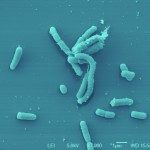Lien vers Pubmed [PMID] – 16333119
J Clin Microbiol 2005 Dec; 43(12): 6155-60
Yersinia pseudotuberculosis is a gram-negative bacterium that infects a wide range of animals, including humans, and is transmitted by the fecal-oral route. This species is found globally and is responsible for human outbreaks, mainly in cold countries. The aim of this study was to evaluate the potential of ribotyping for the molecular typing of worldwide isolates. For this purpose, 80 strains of Y. pseudotuberculosis belonging to the six classical serotypes and nine subserotypes and isolated from various countries and different hosts were analyzed. Combination of the EcoRI and EcoRV ribopatterns allowed the delineation of 27 ribotypes. In most instances, ribotypes were associated with specific subserotypes and allowed their subdivision. No association between the ribotype and the geographical origin of the strains was observed, arguing for a global spread of this organism. Similarly, no marked association between the ribotype and the type of host was noted, confirming the circulation of this pathogen in the environment, different animal species, and human hosts. Y. pseudotuberculosis exhibited ribopatterns very close to those of Y. pestis, although not completely identical. Altogether, the present study demonstrates that ribotyping may be a useful tool for molecular typing of global isolates of Y. pseudotuberculosis but that it has some limitations due to the small number of hybridizing bands that generate the diversity of the profiles.



